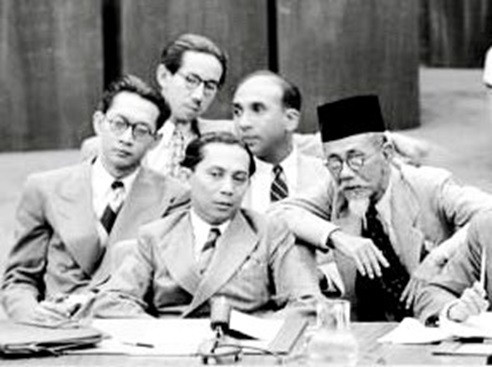Popular Reads
Top Results
Can't find what you're looking for?
View all search resultsPopular Reads
Top Results
Can't find what you're looking for?
View all search resultsThe inside story: How Indonesia-US diplomatic relations started in 1949
In December 1948, Sumitro wrote US secretary of state Marshall that the Netherlands was using US aid for its military operations in Indonesia.
Change text size
Gift Premium Articles
to Anyone
T
his year we celebrate 75 years of United States-Indonesian diplomatic relations. But few know how these relations were enabled in 1949. It is a fascinating story that both Indonesians and Americans can take pride in.
Diplomatic recognition required that the Dutch cease military operations to retake Indonesia and relinquish their claim to sovereignty. From 1946 to early 1949, they refused to do either.
By the end of 1949, they did both. Why?
First, we must credit the patient, skillful negotiating efforts of the leaders of the nascent Indonesian Republic from 1946-1949. Despite their huge imbalance in strength, and harsh Dutch negotiating positions, Indonesian Republican leaders had their end game in mind. They kept talks going just enough to prevent collapse, while seeking international support.
They bolstered the international community’s and United States’ awareness of their genuinely independent nature through deliberate domestic and international actions, including their initiative to send a delegation to the new United Nations in 1947.
Distinguished economist and Finance Minister Sumitro Djojohadikusumo, president-elect Prabowo Subianto’s father, was a key member of the Republic’s UN delegation.
The delegation made its mark in 1947, leading to UN-sponsored steps at mediation of the conflict. When mediation failed, the UN Security Council, led by the US, passed a resolution explicitly calling for an international cessation of hostilities. The Dutch immediately defied the UN, however, reinvading Indonesia in December 1948.
But history unfolds in unforeseen ways. The amazing sequence of events that led the Dutch to abandon Indonesia was as follows:
US journalists reported in December 1948 that the amount of post-war economic assistance slated for the Netherlands under the proposed new US Marshall Plan for aid to Europe was almost exactly the amount the Dutch were spending financing their military reoccupation of Indonesia.
Concomitantly, in December 1948, Sumitro wrote US Secretary of State Marshall that the Netherlands was using US aid for its military operations in Indonesia. Sumitro asked the US to cut off all aid to the Dutch. This was reprinted in the New York Times Dec. 21 of that year.
From these reports, the US realized it was in the unintentional but intolerable position of, in effect, financing Dutch military operations.
With this awareness, US domestic opposition to aid to the Netherlands grew swiftly. US citizen groups and then internationally active members of Congress decried this reality.
Fortunately for history, they did so with teeth: Influential senators introduced an amendment to the pending new legislation for economic aid to Europe that would prohibit any new US financial assistance to the Netherlands unless the Dutch relinquished their control over Indonesia.
By early 1949, the State Department concluded these amendments were likely to pass, which would have threatened the Marshall Plan legislation, the centerpiece of US post-war economic strategy for Europe.
In March 1949, US Secretary of State Dean Acheson informed a shocked visiting Dutch foreign minister Dirk Stikker that unless the Dutch promptly reached a settlement with Indonesia on sovereignty, it would be impossible for the US to include the Netherlands in its post-war economic assistance to Europe.
Historians agree this Acheson-Stikker conversation was what caused the Dutch to change their position and finally begin serious negotiations in the Hague with representatives of the Indonesian Republic.
These talks led steadily to the Dutch declaration of Indonesian sovereignty on Dec. 27, 1949, which permitted the US recognition of the Republic of Indonesia immediately afterward, starting the clock on the 75 years of diplomatic relations that we celebrate today.
The US is proud of its collaborative relationship with the early representatives of the Indonesian Republic, one not only of governments but of concerned citizens, leading to advancing the date of Indonesia’s independence from the Netherlands, and strengthening the 75-year bond between our two countries and peoples that we celebrate this year.
***
The writer is president of US-Indonesia Society (USINDO).











